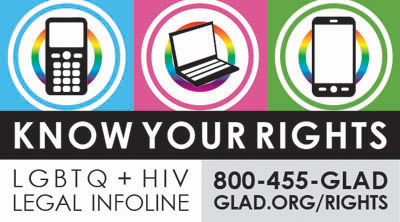One of the great things about living in New England is that all six states offer anti-discrimination protections for LGBT employees and workers who are living with HIV. Most workers are “employees at will” and can be fired or discriminated against by their employer for any reason or no reason at all. However, states have identified “protected characteristics” and made it illegal to fire or discriminate against an employee just because they possess, or are perceived to possess, one or more of those characteristics. For lesbian, gay or bisexual (LGB) workers, the protected characteristic is “sexual orientation,” for workers living with HIV, “disability,” and for transgender workers, “gender identity.”
All six New England states have explicit LGB (sexual
orientation) and HIV (disability) protections and, with the exception of New
Hampshire, have explicit transgender protections (gender identity). Even in New Hampshire, transgender workers
have been protected against discrimination using disability as the protected characteristic. Although all states have protections for
workers who are living with HIV, outside New England only 15 provide
protections for LGB workers and only 11 provide explicit protections to
transgender workers.
If you encounter a situation at work or when applying for a
job where you feel that you have been discriminated against, and the reason for
the discrimination is simply because you possess, or are perceived to possess,
one or more of your state’s protected characteristics, the first step is usually
to try to work out a satisfactory resolution with your employer, or, if you
belong to a union, perhaps try to get help from it.
If the attempt to resolve the issue internally fails, you can
file a complaint with your state’s anti-discrimination commission—each New
England state has one. The complaint
must be filed within a certain time from the last instance of discrimination;
this is called the statute of limitations, and, although it varies from state
to state, it is somewhere between 180 days and a year. It is essential that the complaint documents
that the discrimination was based on having, or being perceived to have, one or
more protected characteristics—i.e., because you are or were perceived to be
gay, transgender or a person living with HIV.
In some cases, it may also be possible to file a federal
discrimination complaint with the Equal Employment Opportunity Commission
(EEOC). However, the federal government does
not currently consider sexual orientation a protected characteristic, so you
cannot file a federal complaint at this time if the discrimination is based on
sexual orientation. (Efforts are ongoing to pass the Employment NonDiscrimination Act, or ENDA, which would make both sexual orientation and gender
identity explicitly protected characteristics at the federal level.)
Interestingly, although the federal government does not have
gender identity as a specific protected characteristic, the EEOC recently
announced that it considers discrimination against transgender employees as a
form of sex discrimination, and so transgender people can file discrimination
complaints with the EEOC, as well as with their state anti-discrimination
commission.
Disability is a federally protected characteristic, and so
people who are discriminated against on the basis of their HIV status, can file
both a state and federal discrimination complaint.
Although the initial complaint usually needs to be filed
with the state’s anti-discrimination commission and/or the EEOC, later on, if
you want to, it is possible to move the
complaint into the state and/or federal courts.
If this sounds too technical, just remember that if you are
LGBT and/or living with HIV, and you are discriminated against
at your work because of this, there are strong legal protections in all six New
England states.
GLAD’s Legal InfoLine
can help you with your particular situation.
Just call 800-455-GLAD (4523) or go to www.glad.org/rights/infoline-contact
For more information about employment
discrimination in the New England states, go to www.glad.org/rights/topics/c/anti-lgbt-discrimination.


No comments:
Post a Comment